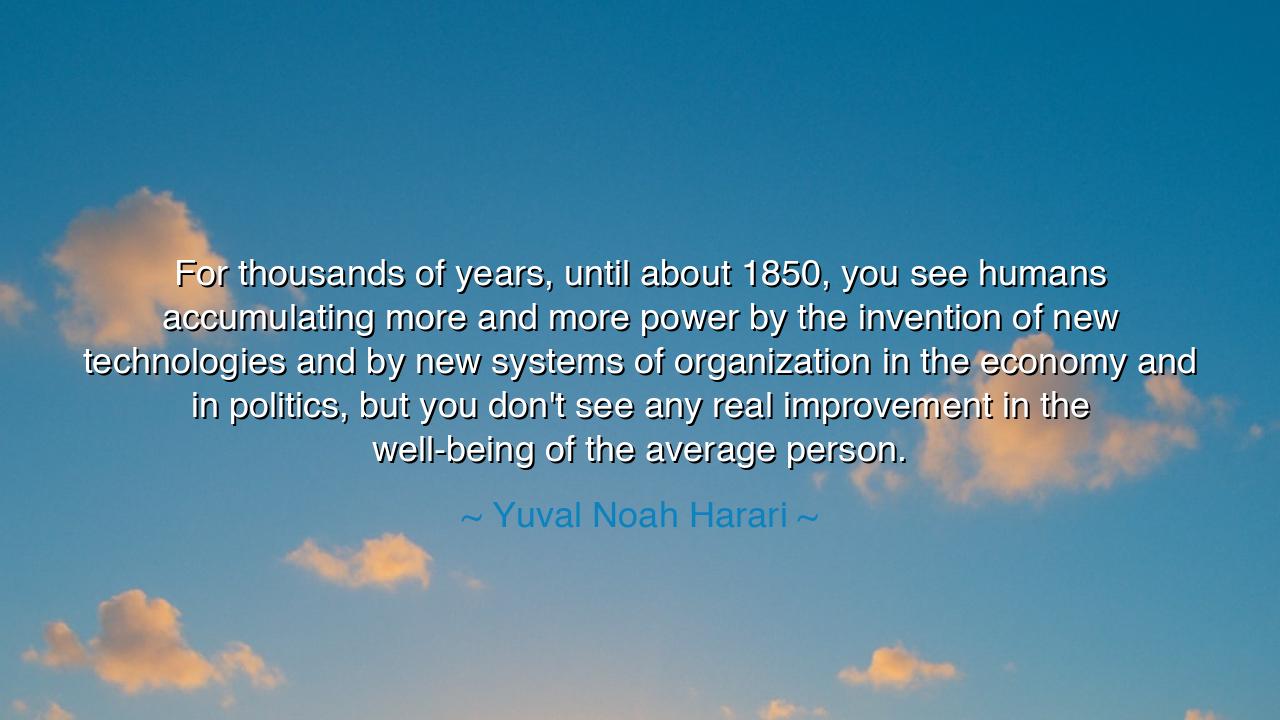
For thousands of years, until about 1850, you see humans
For thousands of years, until about 1850, you see humans accumulating more and more power by the invention of new technologies and by new systems of organization in the economy and in politics, but you don't see any real improvement in the well-being of the average person.






The words of Yuval Noah Harari — “For thousands of years, until about 1850, you see humans accumulating more and more power… but you don’t see any real improvement in the well-being of the average person” — unveil the paradox of human history. For while the mighty built empires and devised technologies that shook the earth, the average person remained chained to hunger, toil, and suffering. It is a reminder that power alone does not equal progress, and that the greatness of a civilization cannot be measured by its monuments if its people live in misery.
Across the millennia, the plow was sharpened, the wheel perfected, the armies made stronger, and the palaces adorned with gold. Kings and conquerors amassed glory, yet the farmer still bent his back in the fields, and the mother still buried her children from famine and plague. The systems of economy and politics grew in complexity, but they served the few while the many languished. Thus Harari speaks a bitter truth: power without compassion brings little light to the common life.
Consider the grandeur of Ancient Rome. Roads spanned continents, aqueducts carried water across mountains, and the legions commanded fear. Yet the ordinary Roman, unless wealthy, dwelt in cramped insulae, labored endlessly, and could be cast into poverty at the whim of fortune. Bread and circuses were offered not to uplift, but to distract. This is the very pattern Harari names — great accumulation of power, little advance in the well-being of the multitude.
It was only with the great turning of the Industrial Revolution, around 1850, that this ancient cycle began to shift. Machines multiplied productivity, medicine began to extend life, and for the first time the average person saw a rising tide lift them, however slowly. It was not an end to suffering, but it marked a new path in history: the possibility that human ingenuity could serve the many, not only the few. Harari’s words call us to see this turning point not as inevitable, but as a revolution of destiny.
Therefore, O children of the future, learn this lesson well: to measure progress, do not gaze only upon the thrones of rulers or the marvels of invention. Ask instead — does it ease the burden of the poor? Does it heal the sick? Does it grant dignity to the common life? For the true measure of civilization is not its power, but its compassion. And as Harari reminds us, thousands of years passed before humanity began to grasp this truth. Let it never again be forgotten.






TQTrung Tran Quoc
It’s interesting that Harari mentions the lack of improvement in the well-being of the average person, despite so much technological and political advancement. Could it be that the focus on technological progress has been misguided all along? Should we have been looking at more holistic forms of advancement—social, emotional, or mental well-being? Or, were the structures of power too rigid to allow those benefits to reach everyone, even as technology advanced?
TDThanh Dinh
I think Harari is pointing out a harsh truth—technological advances can often create more inequality rather than solve it. If humans have been accumulating more power for thousands of years, why have so many remained stuck in poverty or poor conditions? Could it be that the way we’ve used technology and power has actually hindered collective well-being in some ways? What changes need to occur for technology to serve everyone, not just the powerful?
NNNhat Nguyen
This quote makes me think about the nature of technological progress. We often assume that technology automatically improves lives, but Harari challenges that assumption. Could it be that the systems of power and organization are actually the ones benefiting from these innovations, while ordinary people are left behind? What kind of societal changes or reforms would have been necessary to ensure that new technologies actually improved the well-being of the average person?
NNguyen
Yuval Noah Harari’s point here is really thought-provoking. If we look at history, it seems that despite all these technological advances, the average person didn’t necessarily see their quality of life improve until much later. It makes me wonder: What does progress really mean if it’s not improving the lives of the many? Can we truly say we’re progressing if only a small group of people benefit from all these changes?